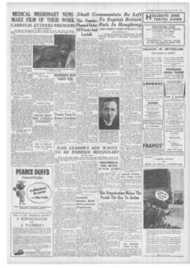Page 2, 18th June 1948
Page 2

Report an error
Noticed an error on this page?If you've noticed an error in this article please click here to report it.
Tags
Share
Related articles
Where Nationalisation Has Disappointed The Miner
Netherlands News Letter
A Trade Union Leader Reviews
French Bishops Back Miners
The Vth Column Threat To Peace
NATIONALISED MINES •
Sut,-I am sure that many readers Of THE CATHOLIC HERALD were surprised and genuinely disgusted with the article, Where Nationalisation has Disappointed the Miners."
The miner is aware of the present defects of nationalisation, but the much improved position of the miner since nationalisation far outweighs the defects and the miner is not disappointed. The joint inquiry suggested by the National Union of Mineworkers was not due to any disappointment, but it was in order that the union would be in a position to deal with misinformed critics.
The order in which the National Coal Board and the National Union of Mineworkers have dealt with the wages problem reflects the dignity and importance which the miners rightly hold now compared to the days of private ownership of the industry. At the end of only four months of nationalisation the miners had a five-day week which not only meant a shorter working week but also an increase in wages and during the first year increased wages have been negotiated for the deputies, clerks, overmen, weekly wage industrial staff and towards the end of the year the day wage miners received another increase of wages. The fact that time and effort can only be used once means that some order of priority in dealing with the injustices already existing in the industry must be adopted and in the long run justice must be observed in dealing with the various claims, ineluding the retrospective application of the settlements to the people who patiently await their turn. The -clerks, overmen and other weekly wage industrial staff were not included in the five-day week agreement and their claims for increased wages were delayed. Consequently the informed miner understands why these wages increases were retrospective to July, 1947, and the wage increase for clay wage miners was retrospective, to November.
The miner has a much greater say in the running of the industry now than ever he had under private ownership. Proposed reorganisation schemes are not only discussed at Colliery Consultative Committee meetings but also at the miners' trade union meetings, when trade union district officials and representatives of the Coal Board consult the miners and discuss the changes, making arrangements where necessary in the human interests of the miners. Alternative employment is arranged for men who cannot be emplosed at the particular pit and where required transport is also arranged. For those men who cannot be re-employed immediately arrangements are made for the payment of wages to continue for a reasonable period.
Instead of loss of personal contact the relations between the workmen and the management brings more personal contact now than ever there has been in the industry. The Conciliation Agreement gives the miner the right to talk personally with the officials and the colliery manager to discuss any grievance he may have; and failing satisfaction he has the right to submit the grievance to his trade union official to be dealt with by the conciliation machinery which fixes a limited period for dealing with any dispute at pit, area and county levels. In addition the men who are now handling labour relations and dealing with disputes at all levels arc "mcn of the men" and are constantly in close contact with the mine's. iously Islr. A. J. Frain has no idea of the machinery for dealing with pit disputes and I can assure him that the comparatively few strikes are not caused by delay in dealing with pit disputes but very often the case on which strike action is taken has never been submitted to the conciliation machinery and in some instances a few men have not been prepared to accept a decision at a representative committee meeting within the conciliation machinery. There is no likelihood of the miner ever saying be " was better off under the coalowners." The wages are much higher, the sense of security greater, the prospects are better and the miner is enjoying a dignity in all respects which was never dreamt of when the industry was in private ownership.
PAT BARTLEY, C.C.
Washington, Co. Durham.
[After reading so optimistic an ac-' count, the ordinary reader may wonder why so little progress is being made towards achieving the output laid down by the Government and necessary to, the country. -Editor, C.H.]
blog comments powered by Disqus









